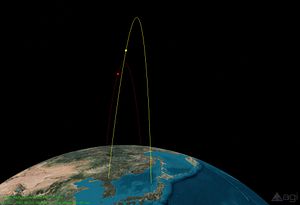Nearly at midnight on July 28– and at 11:11 pm local time on Friday — North Korea launched its second-ever intercontinental ballistic missile (ICBM). The next day, China’s foreign ministry had to work over the weekend to give an urgent response, calling all parties to be cautious.
Just weeks after the first ICBM test on July 4, North Korea carried out its second test on July 28. And according to Japan’s chief cabinet secretary, Yoshihide Suga, the second missile “flew for about 45 minutes before landing in Japan’s exclusive economic zone, which stretches some 200 nautical miles from its coast.”
The U.S. reply to the new launch was harsh and immediate. On July 28, the White House published a statement in the name of President Trump. On the one hand, President Trump strongly condemned the test, saying that “By threatening the world, these weapons and tests further isolate North Korea, weaken its economy, and deprive its people.” On the other hand, President Trump also threatened that “ the United States will take all necessary steps to ensure the security of the American homeland and protect our allies in the region.”
With North Korea’s reckless action as well as the threat from the United States, observers for waiting for Beijing’s response over the weekend. On Saturday, China’s foreign ministry published a short response in the form of question and answer.
When being asked about China’s view on North Korea’s second successful launch of the ICBM, China’s foreign ministry Spokesperson Geng Shuang replied that China is concerned about the current developments.
Regarding North Korea’s behavior, Geng Shuang said:
China opposes North Korea’s breach of the UN Security Council resolutions and the general will of the international community. China urges North Korea to abide by the relevant resolutions of the Security Council and stop taking action that could lead to further escalation of the situation on the peninsula.
Then, Geng Shuang switched his focus toward other parties without mentioning names:
At the same time, we hope that the parties concerned will act with prudence, prevent the tensions from escalating, and jointly safeguard peace and stability in the region.
Although China didn’t mention the United States, it could be read between the lines that China’s reply is more directed toward the United States than to North Korea. In the short address, China did criticize North Korea’s action and point out that North Korea’s behavior was against international will. But the hidden highlight was actually pleading with Washington not to take ‘imprudent’ steps.
However, as North Korea is becoming more and more reckless, such pleas from China seem to be coming less and less persuasive.
Charlotte Gao holds a MA degree in Asian Studies. Her research interests center around East Asian topics. She has worked in the past as a news editor, reporter, and writer for multiple traditional, online, and new media outlets.

































